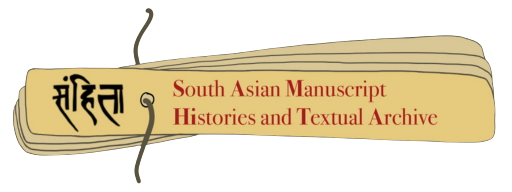Manuscripts
Search Filter
Āṣeṭācakram
EAP1023/16/16 Language : Sanskrit Scripts : Devanagari
Two folios of a jyotiṣa text which the colophon states was authored by Kavi Ḍhuṇḍhigaṇaka, probably a reference to Ḍhuṇḍhirāja (fl. c. 1525), whose Jātakābharaṇa includes a chapter on cakraphalam. The manuscript was copied sometime in the 17th century.
Ekādaśīvratamāhātmya
EAP1023/16/15 Language : Sanskrit Scripts : Devanagari
A text on Ekādaśī (11th day of the lunar cycle), and the observances devotees of Viṣṇu follow to seek His blessings. The māhātmya are compiled from different purāṇa-s: Bhaviṣyottarapurāṇa, Brhmāṇḍapurāṇa, Skandapurāṇa, Varāhapurāṇa and Brahmavaivarttapurāṇa. The text gives the names of Ekādaśī-s (Śayanīekādaśī, Kāmikaekādaśī, Putraekādaśī, Padmaekādaśī, Indirāekādaśī), and describes vrata-s like Mohinīvrata, Nirjalāvrata.
Vidagdhamukhamaṇḍana
EAP1023/16/11 Language : Sanskrit Scripts : Devanagari
An incomplete manuscript of the text illustrating alaṃkāraśāstra through puzzles and riddles, authored by the Jain ascetic Dharmadāsa prior to 1050 CE. The manuscript has two out of four pariccheda-s. Each of the 17 folios has marginal notes and there are several mandala diagrams.
Traipuramahopaniṣad Bhāṣya
EAP1023/16/10 Language : Sanskrit Scripts : Devanagari
A commentary by Bhāskararāya (fl. 1728–1750) on the Tripuropaniṣad (also known as the Kāmakalopaniṣad, Tripurāmahopaniṣad or Śrīvidyopaniṣad), which forms the sixth section of the Mahopaniṣad and invokes Goddess Tripurāsundari as the ultimate power. The first folio is missing.
Ajīrṇamañjarī
EAP1023/16/9 Language : Sanskrit Scripts : Devanagari
An Ayurvedic text (two and a half) that discusses diet, foods, home remedies and recipes. The author is said to be Vaidyarāja, probably a title. The first seven śloka-s are similar to Kāśīnātha’s Ajīrṇamañjarī. Aniruddha Sūrī was the owner of this manuscript, which is dated Saṃvat 1873 (1816 CE).
Keśavīyajātakapaddhati
EAP1023/16/7 Language : Sanskrit Scripts : Devanagari
An incomplete manuscript of a jyotiṣa text in 42 verses composed by Keśava Daivajña, so also known as Keśavapaddhati. The author (fl. 1496/1507) was from Nandigrāma (Gujarat), son of Kamalākāra Daivajña, and father of jyotiṣi-s Ananta, Gaṇeśa and Rāma. This manuscript has verses 28‒42 of the printed edition, but these are numbered afresh for each adhyāya. After the concluding verse, the scribe Aniruddha Śarman has added a few lines relating to ‘grahalāghava’ (simplifying astrological calculations) which include chronograms. The manuscript was written in Nepal Saṃvat 926 (1805 CE).
Jaiminīyanyāyamālāvistara
EAP1023/16/4 Language : Sanskrit Scripts : Devanagari
A metrical summary and prose explanation of Jaimini’s Pūrvamīmāṃsāsūtra by Mādhavācārya, minister to King Bukka of Vijayanagara (NCC Vol. 7). The original work has 12 adhyāya-s (chapters); this manuscript has part of the first (up to the fifth adhikaraṇa of the third pāda).
Mālatīmādhava
EAP1023/16/3 Language : Sanskrit Scripts : Devanagari
A complete text of the drama in ten acts by Bhavabhūti, a prakaraṇa text (i.e., whose plot is invented), on the romance between Mālatī and Mādhava. The scribe Bhānudattaśarman says he wrote the manuscript in Kantipur in Śaka 1716 (1794 CE). Below, in a different hand and in red pen, is written Saṃvat 1878 (1821 CE), and a reference to purchasing the manuscript for three mudra-s, probably by the person who bought it.
Vedaparibhāṣā
EAP1023/16/1 Language : Sanskrit Scripts : Devanagari
This is a śikṣā text on the pronunciation of certain letters in the Veda-s, as followed by the Mādhyandinīśākhā of the Śuklayajurveda. It consists of nine sūtra-s (‘paribhāṣāṅkasūtra’) with extended commentary, and six kārikā-s. The commentary and kārikā-s are by Keśavarāma Daivajña, to whom some manuscripts attribute the sūtra-s as well. The work is also known as Mādhyandinīya Paribhāṣāṅka, Keśavaśikṣā and Navāṅkasūtra. The scribe is Lokanātha.
Sāṅkhyakārikā/Sāṅkhyasaptati
EAP1023/16/2 Language : Sanskrit Scripts : Devanagari
A commentary by Vācaspati Miśra (1450‒1480, Mithilā) on Īśvarakṛṣṇa’s Sāṅkhyakārikā or Sāṅkhyasaptati. The colophon mentions its alternative title, ‘Saptatiṭīkā’.
Pañcavidhamātṛkānyāsa
EAP1023/17/14 Language : Sanskrit Scripts : Devanagari
A manual for priests on the pūjā for the Divine Mothers (mātṛkā-s): nyāsa is a process of ‘laying down’ deities on the body through mantras specific to each part (Douglas Brooks 1990).
Vedāntaparibhāṣā
EAP1023/17/13 Language : Sanskrit Scripts : Devanagari
An introduction to Advaita epistemology using Navya-Nyaya terminology, composed in the 17th century by Dharmarājādhvarīndra, grand disciple of Nṛsiṃhāśrama and disciple of Veṅkaṭanātha of Velāṅguḍi village in Tanjore. The manuscript is incomplete, ending with ‘rajatajñāne gurumatapraveśaśaṅkā’ in the chapter on ‘pratyakṣa’.













